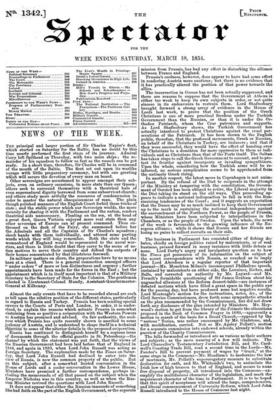The business in Parliament has consisted either of fishing de-'
bates, chiefly on foreign politics raised by malcontents, or of real business pressed forward in many instances with little debate or none. Lord Derby's angry and inculpatory question as to how the Times got possession of its information on the subject of the secret correspondence with Russia, so couched as to imply that Lord Aberdeen is a regular reporter of that important journal—Mr. Monekton Milnes's inconsequent Philhelene speech, sustained by malcontents on either side, the Lovaines, Riches, and Balls, and corrected on authority by Mr. Layard—and Mr. French's formidable questioning of Sir Yames Graham about his unguarded allusions at the Reform dessert-table—are instances of debated motions which have filled a great space in the public eye for the passing day, but have produced none but negative results. Lord Monteagle's motion for the instructions, notes &c., of the Civil Service Commissioners, drew forth some sympathetic attacks on the plan recommended by the Commissioners, but did not draw forth any disclosure of the plan intended by Ministers. Mr. Hey- wood's motion to get from the library of the Primate the alterations proposed in the Book of Common Prayer in 1689,—apparently a motion in search of the basis for a Broad Church,—opposed by the " serious " Tories, was rather encouraged by Mr. Gladstone, and, with modification, carried. Not so Mr. Apsley Pellatt's motion for a separate commission into endowed schools, already within the purview of the Charity Commissioners.
The bills forwarded or introduced are as various as their authors and subjects ; as the mere naming of a few will indicate. The Lord Chancellor's Testamentary Jurisdiction Bill, and Mr. Card- well's Coasting Trade Bill, read a_ second time in the Lords—Mr, Forster's Bill to prevent payment of wages by "track," at the same stage in the Commons—Mr. Headlam's to modernize the law of mortmain Mr. Pellatt's supererogatory measure to substitute declaration for oath, and Mr. Whiteside's two, to assimilate the Irish law of high treason to that of England, and secure to nuns free disposal of property, all introduced into the Commons—ex- emplify the multifarious character of the legislation, and mark the acquiescent character of the time in Parliament. It is to be hoped that this spirit of acceptance will attend the large, comprehensive, and liberal commencement of University Reform which Lord John. Russell introduced to the House of Commons last night.


























